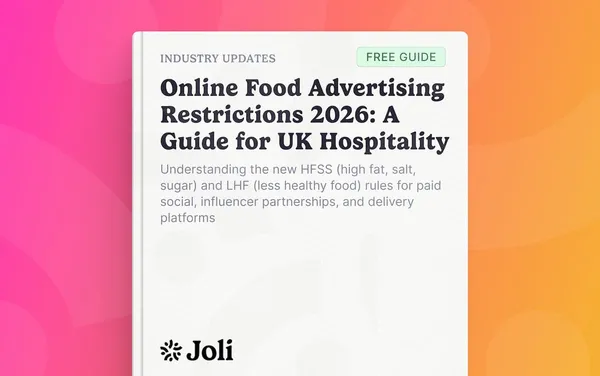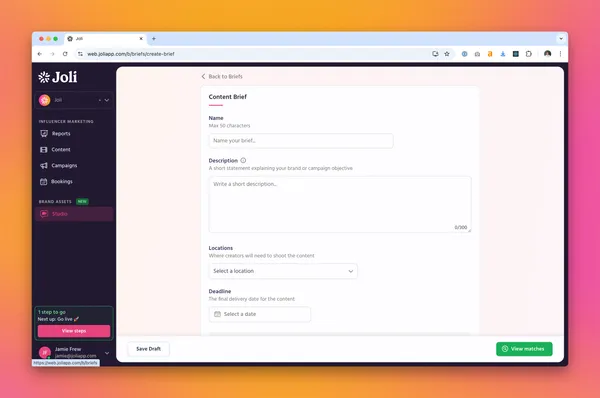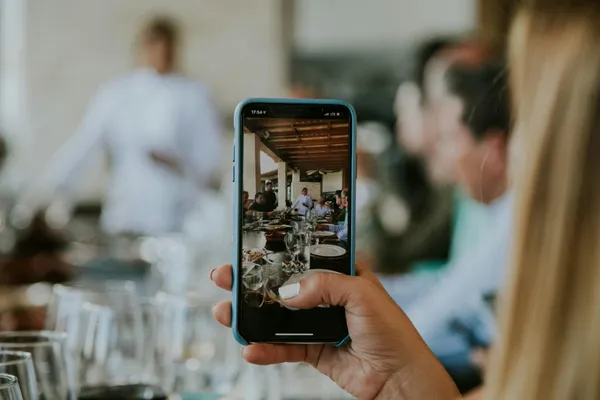Table of Content
Why Choose a Hospitality Marketing Agency in London?
1.1 Benefits of Specialised Marketing
1.2 Understanding Local and Global Reach
1.3 Tailored Strategies for London’s Market
Services Offered by Hospitality Marketing Agencies
2.1 Branding and Design Services
2.2 Organic Social Media Services
2.3 Paid Advertising Services
2.4 Influencer Marketing Services
How to Select the Right Agency for Your Business
3.1 Assessing Experience and Track Record
3.2 Evaluating Case Studies and Testimonials
3.3 Compatibility with Your Brand’s Vision
The Role of Influencers in Hospitality Marketing
4.1 Why Choose Influencers for Your Marketing?
4.2 Benefits of Working with Influencers
4.3 Tracking and Measuring Impact of Influencer Campaigns
4.4 Affordable Alternatives to Agencies with Platforms like Joli
Getting Started with a Hospitality Marketing Agency
5.1 Steps to Partner with an Agency
5.2 Measuring the Ongoing Success of Agencies
5.3 When to Consider Changing Agencies
5.4 When to Consider Bringing Marketing In-House
1. Why Choose a Hospitality Marketing Agency in London?
1.1 Benefits of Specialised Marketing
Collaborating with a hospitality marketing agency that specialises in London’s dynamic market can significantly streamline your marketing efforts. These agencies have profound expertise in understanding local market trends and customer behaviours, which allows them to craft targeted strategies that resonate with your audience. They go beyond generic marketing approaches and focus on key areas such as local SEO and hospitality advertising, which enhances your online visibility in location-specific searches.
Specialised marketing agencies are becoming more and more adept at leveraging their industry connections and insights. They can connect your restaurant or hotel with influencers and media outlets that bring genuine value, something time-consuming and often less effective when handled internally. By tapping into an agency’s network and experience, you ensure that every marketing pound spent works harder for your branding and outreach efforts.
Pro-tip: Collaborate with agencies that have proven success within London’s food and hospitality scene to ensure a better ROI on your marketing budget.
1.2 Understanding Local and Global Reach
London is a global city, and having a marketing agency for hospitality that understands both local quirks and international appeal is crucial. Agencies based in London are uniquely positioned to balance localised campaigns while still giving your brand international exposure. They know how to harness global trends and adapt them locally, making your marketing more relevant and impactful.
For example, a London-based hotel marketing company might help you tap into the tourism market by promoting your luxury hotel or boutique hotel in international travel guides and across popular social media platforms frequented by international visitors. This dual emphasis on local and global markets ensures your campaigns are both broad-reaching and attuned to local customer preferences, driving more foot traffic through your doors.
Fun fact: According to recent studies, over 60% of tourists use online reviews and social media recommendations to choose dining destinations and hotels when visiting new cities (Source: VisitBritain).
1.3 Tailored Strategies for London’s Market
Understanding the unique demands of London’s market is essential for effective marketing hospitality. A specialised restaurant marketing agency will customise strategies that address specific local nuances, such as the city’s diverse demographic and high competition level. These agencies use data-driven insights to tailor their efforts, ensuring your campaigns are not only creative but also highly effective.
For instance, a tailored strategy might involve creating targeted promotions for different London boroughs, tapping into local events or cultural festivities, and even adjusting your messaging for the varied customer segments in the city. This level of customisation is challenging to achieve with in-house teams, given the resource and knowledge constraints typical in many restaurant groups and hotels.
Pro-tip: Engage with agencies that use local events and demographics as a crucial part of their marketing strategy to ensure your efforts resonate deeply with your target audience.
By delving into the benefits of specialised marketing, local and global reach, and tailored strategies, you can see how a hospitality marketing agency in London can propel your restaurant group or hotel forward. Consistent branding, increased efficiency, and a more strategic approach can transform your marketing outcomes, making your life as a Digital Marketing Manager significantly smoother and more impactful.
2. Services Offered by Hospitality Marketing Agencies
2.1 Branding and Design Services
Branding and design are fundamental aspects of positioning your restaurant or hotel in London’s competitive market. A hospitality branding agency will help you develop a unique brand identity that reflects your establishment’s ethos. This includes creating a memorable logo, selecting suitable colour palettes, and designing visually appealing menus and signage. These elements collectively set the tone for your guest’s entire dining or staying experience, from the moment they see your signage to when they leave the restaurant or check out of your hotel.
Moreover, professional design services ensure consistency across all customer touchpoints. Websites, social media profiles, and printed materials must uniformly represent your brand. A marketing agency can manage this by crafting visually cohesive designs that align with your restaurant’s or hotel’s theme and message. Consistency is key— it not only builds brand recognition but also fosters customer trust and loyalty.
Pro-tip: Ensure your branding elements are versatile and can be easily adapted for various marketing materials, including website design and digital marketing collateral.
2.2 Organic Social Media Services
Organic social media efforts are vital for engaging with your audience without the constant need for ad spend. Hospitality marketing agencies can handle your social media profiles, creating and posting regular content that resonates with your target audience. This includes posting high-quality images of your dishes or hotel rooms, sharing user-generated content, and engaging with followers through comments and messages.
An agency can also run monthly social media audits to analyse what types of posts are performing best. By understanding your audience’s preferences, they can tailor content accordingly, helping to increase engagement rates and build a loyal online community. This proactive management allows you to keep your restaurant’s or hotel’s online presence lively and engaging without the day-to-day stress of handling it in-house.
Pro-tip: Post at peak times based on your audience’s activity to boost visibility and engagement. This strategy can significantly improve your organic traffic and search rankings.
2.3 Paid Advertising Services
Paid advertising, including Google Ads, PPC, and social media ads, is an effective way to immediately boost visibility and attract more diners or guests. Hotel digital marketing agencies can create targeted campaigns that reach potential customers in specific London areas. They employ a mix of search ads, display ads, and remarketing strategies to maximise reach and return on investment (ROI).
Agencies also handle the optimisation of ad budgets, ensuring that your money is spent efficiently. They continuously monitor and adjust campaigns based on performance metrics such as click-through rates (CTR) and conversion rates. This ensures you get the best possible results from your advertising spend with minimal waste. For hotels, this might include strategies like leveraging Google Hotel Ads to drive direct bookings and reduce reliance on OTAs.
Pro-tip: Use location-based targeting to reach diners or travellers in proximity to your restaurant or hotel for more effective ad spend.
2.4 Influencer Marketing Services
Influencer marketing is a powerful way to drive brand awareness and engagement in the hospitality industry. A restaurant marketing agency London can connect you with London influencers who align with your brand values and have a dedicated following. These collaborations can showcase your restaurant’s menu, hotel’s amenities, atmosphere, and unique selling points to a broader audience.
While agencies can provide access to a network of influencers, it’s essential to ask about their reporting capabilities. Make sure you receive detailed insights on campaign performance, such as reach, engagement, and conversions. If reporting isn’t offered by default, be sure to request it. This data is crucial for measuring the impact on your revenue growth and guest experience.
Pro-tip: Some agencies might use tools like Joli to get advanced reporting and integrations with booking platforms, ensuring a more streamlined and measurable approach to influencer campaigns.
3. How to Select the Right Agency for Your Business
3.1 Assessing Experience and Track Record
Finding the right hospitality marketing agency involves dissecting their experience and track record. Look for agencies with a portfolio showcasing successful projects similar to your goals. For instance, if you’re a restaurant group aiming for broader brand awareness, you’ll want to see case studies where they’ve successfully partnered with large influencers (500k+ followers). Evaluating this data helps you ensure they can handle campaigns on the scale you require.
To streamline this process, create a checklist:
- Look for industry-specific experience: Have they worked with restaurants, hotels, or food-related businesses?
- Success metrics: What were their ROI on past campaigns? Look at actual numbers if available.
- Reputation: Do they have positive client testimonials and case studies? For example, see if their past clients have documented increases in reach and engagement similar to your goals.
Pro-tip: When selecting an agency, ask them to provide specific examples of how they’ve driven success for clients with similar goals. Look for detailed case studies that outline the strategies used, the influencers involved, and the measurable outcomes. This will give you confidence that they can replicate similar results for your business.
3.2 Evaluating Case Studies and Testimonials
Evaluating an agency’s case studies and testimonials gives you insight into their practical results and client satisfaction. Focus on the specifics—details about the influencers they worked with, the campaign goals, and the outcomes achieved. Authentic feedback from businesses similar to yours can reveal how well the agency meets client expectations.
Here’s a step-by-step approach:
- Scrutinise testimonial authenticity: Are client reviews specific or generic? Genuine testimonials often detail exact outcomes, such as increased foot traffic or enhanced social media engagement.
- Analyse detailed case studies: Look for comprehensive case studies that highlight before-and-after scenarios. For example, have they outlined strategies for new menu launches or hotel promotions that led to increased visibility and customer engagement?
Pro-tip: Reach out directly to the businesses featured in case studies to ask if they still work with the agency. This can give you additional insights into the agency’s ability to maintain long-term, successful relationships.
3.3 Compatibility with Your Brand’s Vision
Ensuring compatibility with your brand’s vision is crucial for a symbiotic relationship with the agency. An agency that understands your brand’s ethos and goals will align their marketing strategy accordingly. This alignment can make all the difference in the authenticity and effectiveness of your campaigns, whether you’re a luxury hotel or a trendy restaurant.
Actionable steps:
- Communicate your brand identity clearly: Share your vision, mission, and values upfront. Observe how the agency reacts and if their ideas resonate with these.
- Observe their pitch: During initial meetings, note if the agency proposes strategies that reflect an understanding of your brand. Do they suggest influencers who match your brand’s tone and style?
- Review past collaborations: Have they maintained consistency in brand messaging for other clients? For instance, a restaurant brand would want consistent communication across promotions.
Pro-tip: Ask for a small sample strategy or a trial campaign. This gives you tangible insight into their creative process and how well they can represent your brand through content marketing and digital PR efforts.
4. The Role of Influencers in Hospitality Marketing
4.1 Why Choose Influencers for Your Marketing?
Influencers play a crucial role in marketing, especially in the hospitality sector. They bridge the gap between businesses and customers by authentically showcasing your restaurant or hotel, creating genuine buzz. With influencers, your target audience gets direct recommendations from trusted sources, driving better engagement and conversion rates than traditional advertisements.
Furthermore, influencers help you tap into new customer segments. Whether you’re launching a new menu, opening a new location, or promoting a boutique hotel, partnering with influencers can lead to increased footfall and higher sales. The relatable, authentic endorsements influencers provide resonate well with modern consumers, encouraging them to visit and dine at your establishments or book a stay at your hotel.
4.2 Benefits of Working with Influencers
Working with influencers offers many distinct advantages for your hospitality business. Primarily, influencers can boost your brand’s reach significantly. They already have a loyal, engaged audience who trust their recommendations. For instance, collaborating with a food blogger or travel influencer covering restaurants and hotels in your area can introduce your eatery or accommodation to thousands of potential customers quickly and more cost-effectively.
Another benefit is the content marketing aspect. Many influencers are skilled in producing high-quality photos, videos, and written content. This type of user-generated content can be re-shared on your own social media channels, enhancing your digital presence and supporting your overall digital marketing strategy.
4.3 Tracking and Measuring Impact of Influencer Campaigns
Tracking and measuring the impact of influencer marketing campaigns can be challenging. Agencies often rely on basic metrics like likes, comments, and shares to gauge success. While these indicators provide some insight into engagement, they don’t always capture the full picture, such as the actual influence on sales or long-term brand loyalty.
It’s crucial to establish clear, quantifiable goals from the outset—whether that’s growing your social media following, increasing website traffic, or boosting engagement rates. However, without more advanced tracking methods, it can be difficult to connect these metrics to real business outcomes like revenue growth or improved search rankings.
Pro-tip: Some agencies use platforms like Joli, where influencers connect their social accounts directly to the platform. This allows for deeper insights into actual performance data, offering a clearer view of what’s truly driving your marketing success.
5. Getting Started with a Hospitality Marketing Agency
5.1 Steps to Partner with an Agency
Starting your collaboration with a hotel digital marketing agency or restaurant digital marketing agency involves several steps. Firstly, identify your business goals. Are you looking to rebrand, boost social media presence, or improve direct bookings? Clearly defining your objectives will help you find an agency that aligns with your vision. Secondly, research potential agencies by reviewing their portfolios, case studies, and testimonials. Check if they have experience in the hospitality industry and specifically in cities like London to ensure they understand your market.
Once you’ve shortlisted potential agencies, arrange initial consultations. During these meetings, discuss your goals, challenges, and expectations. Make sure to ask about their proposed strategies and how they measure success. Sign a contract that outlines the scope of work, timelines, and costs. Clear documentation helps avoid misunderstandings down the line. Additionally, establish a point of contact within your team to liaise with the agency, ensuring smooth communication.
Pro-tip: Create a checklist of your goals and potential agency attributes to stay focused during your selection process. This can include their expertise in areas like SEO, PPC, and email marketing for hotels or restaurants.
5.2 Measuring the Ongoing Success of Agencies
To assess the performance of your hospitality marketing agency, set clear KPIs at the start of the partnership. These could include metrics like increased website traffic, higher booking rates, or enhanced social media engagement. Use tools like Google Analytics and social media insights to track these metrics regularly. Monthly or quarterly performance reviews with the agency can help ensure they are meeting your expectations and adjusting strategies as needed.
Another effective way to measure success is to solicit feedback from your customers. Surveys and reviews can provide insights into customer perceptions and highlight areas for improvement. Additionally, assessing ROI on marketing spend is crucial. Compare the costs of campaigns with the revenue generated to ensure the investment is yielding tangible benefits. For instance, if an influencer campaign led to a surge in bookings for your apart-hotel or restaurant, that’s a clear indicator of success.
Pro-tip: Regularly update your KPI goals based on campaign performance to stay aligned with evolving business needs and the changing landscape of hospitality advertising.
5.3 When to Consider Changing Agencies
Recognising when to switch agencies is essential for sustained business growth. One major indicator is stagnant performance metrics. If your key performance indicators aren’t improving despite ongoing campaigns, it may be time to explore other options. Poor communication is another red flag. Consistent miscommunication or lack of responsiveness from the agency can hinder campaign effectiveness and overall collaboration.
Additionally, if the agency’s strategies do not align with your evolving business goals or market trends, this mismatch can affect your brand’s growth. Conduct periodic agency performance assessments against your goals. If you find a persistent gap between expectations and results, it’s worth considering a switch. Consulting peers in the hospitality industry for agency recommendations can also provide new insights and options.
Pro-tip: Keep a log of communication issues and unmet expectations to present clear reasons if a change becomes necessary. This can help you articulate your needs more effectively when seeking a new hotel agency or restaurant marketing agency.
5.4 When to Consider Bringing Marketing In-House and Empowering Your Team
There are times when bringing your marketing efforts in-house might be the best decision for your business. If agency costs are exceeding the value they provide, it could be a sign to reassess your strategy. Managing marketing in-house allows for greater control over your brand’s direction, faster decision-making, and potential cost savings. However, it’s essential to evaluate whether your team has the necessary expertise or if additional training is required to ensure a smooth transition, especially in areas like SEO, PPC, and content marketing.
To make this shift successful, equipping your team with the right tools is key. Here are some powerful platforms that can replace many of the functions traditionally handled by an agency:
- Later (for Organic Social Media Management): Plan, schedule, and analyse your social media posts across multiple platforms. Later helps you maintain a consistent posting schedule, ensuring your brand stays active and engaged with your audience.
- HARO (now Connectively, for PR): Connectively (formerly HARO) allows you to secure media coverage by connecting you directly with journalists looking for sources. This can help your business gain valuable press exposure without needing a PR agency.
- Canva (for Content Creation): Canva enables you to design high-quality graphics, social media posts, and marketing materials in-house. It’s user-friendly and offers a range of templates and design tools, perfect for teams without dedicated design expertise.
- Ad Platforms with AI Tools (for Advertising): Many ad platforms, such as Facebook Ads and Google Ads, now offer AI-driven tools that simplify campaign management. These tools can automate targeting, bidding, and optimisation, allowing you to run effective campaigns with minimal manual input.
- Joli (for Influencer Marketing and UGC): Manage influencer relationships, streamline messaging and bookings, and access a centralized content gallery. Joli can help your team efficiently handle influencer campaigns and user-generated content, ensuring consistency across all marketing channels.
Pro-tip: When transitioning to in-house marketing, focus on your team’s strengths and address any training needs early on. Leveraging the right mix of tools will enable your team to manage campaigns effectively and maintain a cohesive brand presence across all platforms, from your website design to paid media efforts.
Getting started with a hospitality marketing agency can provide your business with the expertise needed to elevate your brand. By carefully selecting the right agency, measuring their performance, and knowing when to switch or bring efforts in-house, you set your hospitality brand up for success in the competitive world of hotel and restaurant marketing.



